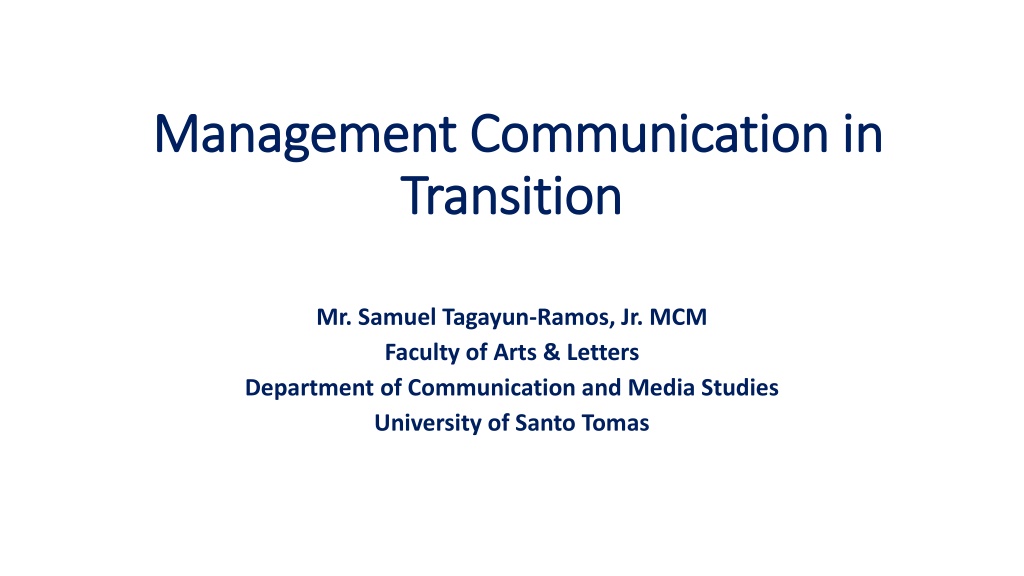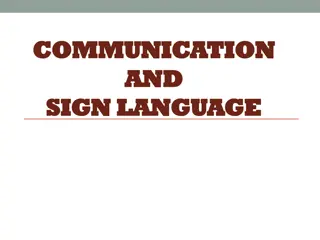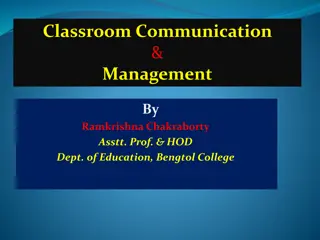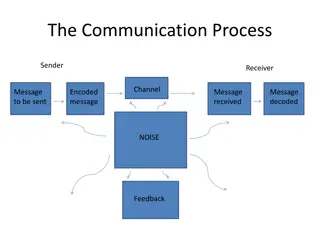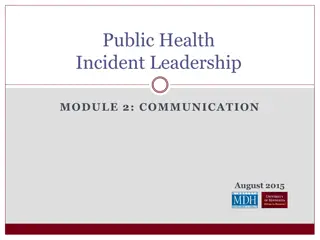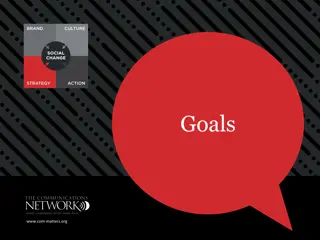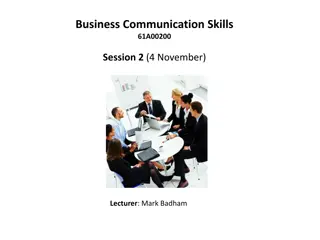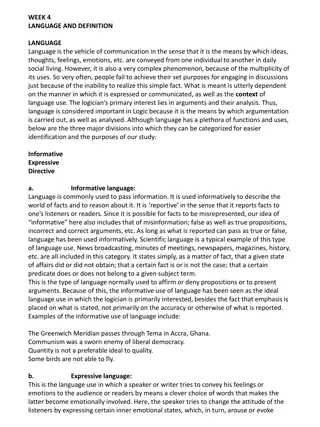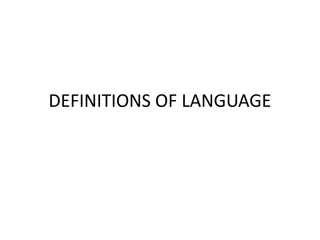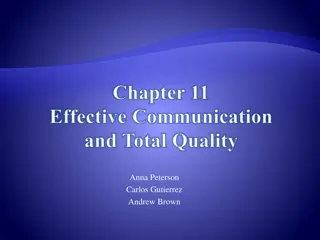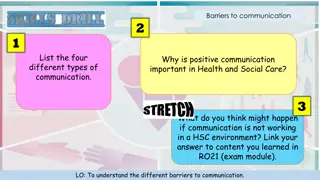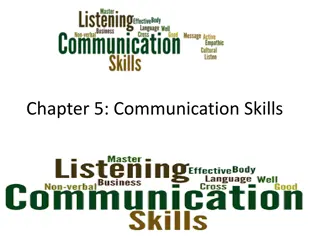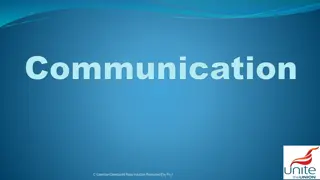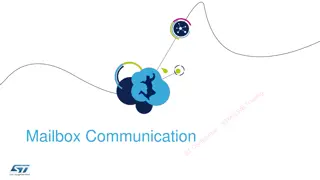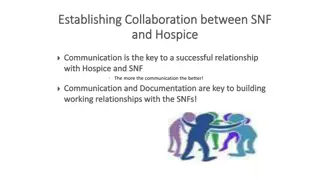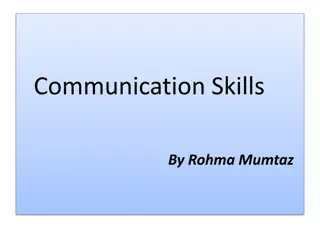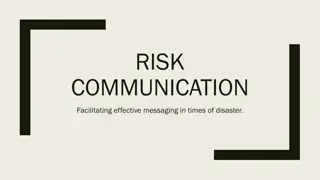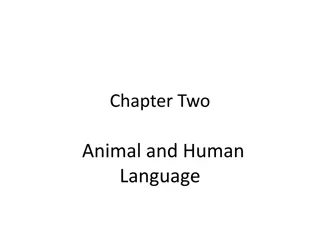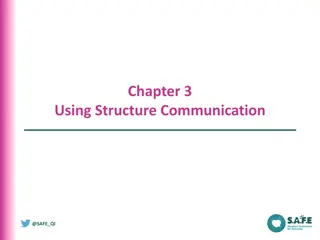The Role of Language in Effective Management Communication
Effective management communication relies on understanding language to shape perceptions, take action, and achieve organizational goals. Language is a vital tool for managers to inspire action, build relationships, and drive success within complex organizations. Professors like Peter Drucker and Harvard Business School experts emphasize the importance of rhetoric in management, highlighting the need for managers to master communication skills to lead effectively.
Download Presentation

Please find below an Image/Link to download the presentation.
The content on the website is provided AS IS for your information and personal use only. It may not be sold, licensed, or shared on other websites without obtaining consent from the author. Download presentation by click this link. If you encounter any issues during the download, it is possible that the publisher has removed the file from their server.
E N D
Presentation Transcript
Management Communication in Management Communication in Transition Transition Mr. Samuel Tagayun-Ramos, Jr. MCM Faculty of Arts & Letters Department of Communication and Media Studies University of Santo Tomas
At the midpoint of the twentieth century, management philosopher Peter Drucker Managers have to learn to know language, to understand what words are and what they mean. Perhaps most important, they have to acquire respect for language as [our] most precious gift and heritage. The manager must understand the meaning of the old definition of rhetoric as the art which draws men s hearts to the love of true knowledge. wrote,
Later in the twentieth century, Harvard Business School professors Robert Eccles andNitin Nohria reframedDrucker s view to offer a perspective of management that few others have seen. To see management in its proper light, they write, managers need first to take language seriously. In particular, they argue, a coherent view of management must focus on three issues: the use of rhetoric to achieve a manager s goals, the shaping of a managerial identity, and taking action to achieve the goals of the organizations that employ us. Above all else, they say, the essence of what management is all about [is] the effective use of language to get things done
The job of becoming a competent, effective manager thus becomes one of understanding language and action. It also involves finding ways to shape how others see and thinks of you in your role as a manager. A number of noted researchers have examined the important relationship between communication and action within large and complex organizations and conclude that the two are inseparable. Without the right words, used in the right way, it is unlikely that the right actions will ever occur. Words do matter, write Eccles & Nohria, they matter very much. Without words we have no way of expressing strategic concepts, structural forms, or designs for performance measurement systems. Language, they conclude, is too important to managers to be taken for granted or, even worse, abused.
So, if language is a managers key to effective action, the next question is obvious: How good are you at using your language? Your ability to take action to hire people, to restructure an organization, to launch a new product line depends entirely on how effective you use rhetoric, both as speaker and as a listener. Your effectiveness as a speaker and writer determine how well you are able to get others to do what you want. And your effectiveness as a listener will determine how well you understand others and can do things for them. will
Management Communication Movement Information Skills Speaking Critical thinking Writing Knowledge Listening Challenges
What Do Managers Do All Day? If you were to consult a number of management books for advice on the nature of managerial work, many if not most would say that managers spend their time engaged in planning, organizing, staffing, directing, coordinating, reporting, and controlling. These activities, as Jane Hannaway found in her study of managers at work, do not , in fact, describe what managers do. describe vague objectives that managers are continually trying to accomplish. The real world, however, is far from being that simple. The world in which most managers works is a messy and hectic stream of ongoing activity. At best they seem to
Managers are in constant action. Virtually every study of managers in action has found that they switch frequently from task to task, changing their focus of attention to respond to issues as they arise, and engaging in large volume of tasks of short duration. Professor Harvey Mintzberg of McGill University observed CEOs on the job to get some idea of what they do and how they spend their time. He found, for instance, that they averaged 36 written and 16 verbal contacts per day, almost every one of them dealing with a distinct or different issues. Most of these activities were brief, lasting less than nine minutes.
Harvard Business School professor John Kotter number of successful general managers over a five-year period and found that they spend most of their time with others, including subordinates, their bosses, and numerous people from outside the organization. Kotter s study found that the average manager spent just 25% of his or her time working alone, and that time was spent largely at home, on airplanes, or commuting. Few of them spend less than 70% of their time with others, and some spend up to 90% of their working time this way. studied a
Kotter also found that the breath of topics in their discussions with others was extremely wide, with unimportant issues taking time alongside important business matters. managers rarely make big decisions during these conversations and rarely give orders in a traditional sense. They often react to others initiatives and spend substantial amounts of time in unplanned activities that are not on their calendars. How found that managers will spend most of their time with others in short, disjointed conversations. Discussions of a single question or issue rarely unrelated topics in a five minute conversation. managers studied by Lee Sproull showed similar patterns. During the course of a day, they engaged in 58 different activities with an average duration of just nine minutes. His study revealed that More recently,
Interruptions also appear to be a natural part of the job. Rosemary found that the managers she studied could work uninterrupted for half an hour only nine times during the four weeks she studied them. Managers, in fact, spend very little time by themselves. Contrary to the image offered by management books, they are rarely alone drawing up plans or worrying about important decisions. Instead, they spend most of their time interacting with others both inside and outside of the organizations. Stewart
The interactive nature of management means that most management work is conversational. When managers are in action, they are talking and listening. Studies on the nature of managerial work indicate that managers spend about two-thirds to three-quarters of their time in verbal activity. These verbal activities, according to Eccles and Nohria, are the means by which managers gather information, stay on top of things in motion, give orders, assert authority, develop relationships, and spread gossip. In short, they are what the manager s daily practice is all about. through other forms of talk, such as speeches and presentations, they write, managers establish definitions and meanings for their own actions and give others a sense of what the organization is about, where it is at, and what it is up to.
The Roles Managers Play Interpersonal Roles Informational Roles Decision Roles Public Relations Knowledge Management Leadership Advertising Marketing Management
Major Characteristics of the Managers Job Efficiency Is Time is fragmented Values compete and the various roles are in tension A Core Skills In management The job is overloaded
Management Skills Required for the Twenty Fist Century Technical Skill Relating Skill Conceptual Skill
Talk is is the Work 1 on 1 Conversation Telephone Conversation Video Teleconferencing Presentation to small groups Public Speaking
The major channels of management communication are talking and listening
Writing is a career shifter Managers do most of their own writing and editing Documents take on lives of their own
Communication is Invention Without question, communication is a process of invention. Managers literally create meaning through communication. company, for example, is not in default until a team of auditors sits down to examine the books and review the matter. Only after extended discussion do the accountants come to the conclusion that the company is, in fact, in default. It is their discussion that creates the outcome. Until that point, default was simply one of the many possibilities. A
Information is Socially Constructed Information is created, shared, and interpreted by people Information never speaks for itself A messenger always accompanies a message Context always drives meaning
Your Greatest Challenge Create communication phenomenon, that is an inventory of your strengths and of your weaknesses as a manager. Also, simply locate where are you now as a manager. your own make believe concept of yourself as a
